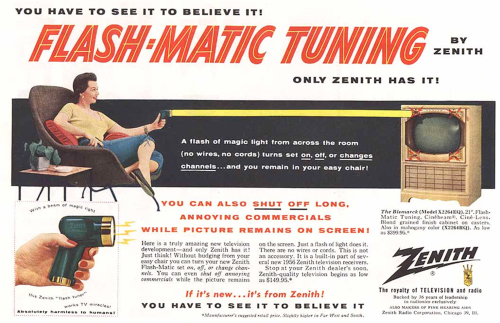We Resume Our Previously Scheduled Program. From 1955.
 Which of these are you prohibited from doing?
Which of these are you prohibited from doing?
A. You watch the game live, and get up for a beer during the commercials.
B. You set your DVR to record the game, and watch it later, fast-forwarding past commercials.
C. You set your DVR to record prime time, and watch some of it later, fast-forwarding past commercials.
D. You set your DVR to record all prime time, and watch some of it later, advancing past all commercials using an automatic feature on your DVR.
E. None of the above.
If you picked Answer E, you may be dismayed to learn that major broadcasters don’t agree with you. Late last month, DISH Network had to sue ABC, CBS, NBC, and FOX to establish whether you or the networks control your TV viewing experience – i.e., whether you’re a pirate for not watching commercials.
Personal media consumption has been ground zero for disruptive innovation for over a century. Since John Philip Sousa assailed “the menace of mechanical music” in 1906 for undermining the domestic market for printed sheet music (a preeminent home entertainment product of the day), content producers have fought change nearly every step of the way.
The bugbear that commercial skipping on recorded content would be the doom of broadcast television is an old favorite, dating from the early 1980s. It was first dispensed with by the Supreme Court in the 1984 “Betamax” case, Sony v. Universal, which concluded that “[o]ne may search the Copyright Act in vain for any sign that the elected representatives of the millions of people who watch television every day have made it unlawful to copy a program for later viewing at home, or have enacted a flat prohibition against the sale of machines that make such copying possible.”
Of course, the old favorites are frequently revived for another turn in new trappings. (Oh, look: a Spider-Man movie.) So it is with the arguments against DISH Network’s new “Hopper” set-top box. The Hopper is an in-home DVR with pre-programmed features to record all prime time television, and to skip commercials, whose legitimacy DISH sued to establish on May 24.
Networks have since responded with lawsuits of their own [ CBS complaint | NBC complaint | FOX complaint ]. They took aim at DISH – and DISH subscribers – for commercial skipping in general, at the Hopper’s multi-tuner nature, and at DISH’s Sling functionality, which allows viewers to watch their cable subscription when they’re not at home. Before the litigation, one network CEO summed up what seems to be the networks’ position: “That’s the ecosystem that we live in, you can’t suddenly change that.” In other words, don’t mess with my business model.
But the networks can hardly claim to be blindsided. In 1955, one of the earliest ads for the Zenith TV remote controls enticed viewers to “shut off annoying commercials”. Over 50 years ago. It is difficult to take seriously complaints that DISH’s new feature is “upset[ting] the apple cart” when people have been avoiding commercials since the Eisenhower Administration.
Your business model won’t last if it demands that the rest of the world order their affairs around you. They won’t.









